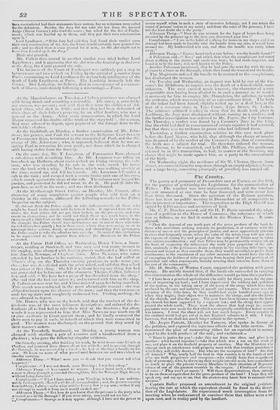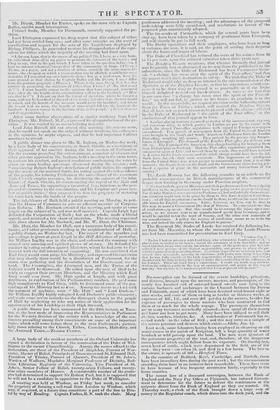ebe Country.
The gentry and yeomanry of Devonshire met at Exeter, on thee 1J'), fur the purpose of petitioning the Legislature for the commutation of Tithes. The weather was very unfavourable, but still the numbers esent amounted at one time to four thousand, and were never less than three thousand. Since the agitation of the Reform question, there has been no public meeting in Devonshire at all comparable to this in interest or importance. The requisition to the High Shen iff was signed by '4 IGO owners and occupiers of laud. Air. C. P. Ilawlyn moved, and Sir II. P. Davie seconded the adop- tion Of a petition to the House of Commons, the substa»ee of which was as follows, as we find it stated in the Weston Times. It coin-
" That the demand of one truth part of the gross produce of the land, by those who contribute nothing towards its .production, is at variance with the dictates of reason and the principles of justice, and most oppressively grievous in eases that frequently occur, whet, the value of the whole crop will not clear the expense of raising It ; and prayed that the subject of Tithes may be taken into serious consideration ; and that Tithes may be permanently mimeo. ed, on the basis of supposing the titheowner the tenth joint proprietor of the soil. But, anxiously as the petitioners desire a change in the existing tithe-laws, (op- pressive and unjust as they consider them, they would nevertheless prefer their continuance, to the enactment of any other measure that would have the effect of exempting the holders of tithe property from bearing their just portion of all parochial and other assessments, thereby severing their interests hum those of the rest of the community."
Air. 11. Studdy, of iVatton Court, supported the petition with great energy. He utterly denied that, if the landlords succeeded in carrying this commutation the whole of the difference would go into their pockets.
" I have been a practical agriculturist (he said) for thirty years, for the pur- pose of improving in)' land; and I have experienced the rubbery and spoliation of the system, in the taking away of the tenth of the crops which hare been produced by the care and industry of myself and tenants. That never was the intention of the tithe-laws, be they established eight hundred years ago, or when they might; their object was to maintain the clergy, and also the fabric of the church, and also the poor. The poor have been thrown upon the land ; the church has been supported by a sepal ate tax ; and the clergy have appro- priated the whole tenth. These were the abuses that had crept in; owouy payments were now made for that which was originally established before moues was known. I trust the abuse will not last much lugger. Every country in the civilized world had gout rid of it, but England subunits to it still. I hope, however, that we shall not much longer submit to this system."
Mr. Jasper Parrott, Member fur Topless, also spoke in favour of the petition, and exposed the injurious effects of the tithe system. He denounced the plan of cumulating tithes for an equivalent in money equal to the tenth produce of the soil ; and exclaimed-
" There is justice for you !—take this tax from one class, and place it on another : what horrid injustice !—take that which was a tax on the stock of one, and place it on the freehold property of another. May the Ministers who attempt such an interference with property meet with that condign punishment which they will richly deserve. But who are the occupiers of land? Are they all tenants? Why, nearly half the land in this country is in the hands of men tilo are both proprietors and occupiers—who chiefly form that magnificent laxly of yeomanry, who, by throwing their weight into the scale, have contributed so much to place the present County Members in their situation of Represen- tatives of one of the greatest counties in the empire. (Continued clawing. A roire—. They won't go again.') Will these Representatives, then, attempt to fix on them an equivalent for the gross produce of the land? I hope they will speak out, and say aye or no, that the electors may know how to estimate their services."
Captain Buller proposed an amendment to the original petition; leaving the rate at which the equivalent should be fixed to the discre- tion of the Legislature. He experienced much interruption from the meeting when he endeavoured to convince them that tithes were a tax upon rent, and in reality paid by the landlord.
Mr. Divert, Member for Exeter, spoke on the same side as Captain Buller, amidst much interruption.
Colonel Seale, Member for Dartmouth, earnestly supported the pe- tition.
Lord Ebrington expressed his deep regret that this subject of tithes bad not been settled long ago ; and after some remarks on the want of coveiliation and respect for the nets of the Legislature displayed by Bishop Phillpots, he proceeded to state his disapprobation of the equi- valent for tithes which the majority of the meeting had fixed upon.
"l, for one, hope, that in the course of my political life, I have, as a very hum- ble individual, done all in my power to promote the interests of the many ; and I 'keg to say, that in the tart which I have taken inn the apac,floti Mate Vona I have no interest whatever, except that of the community at large. ( Ube •rs.) To me, as at payer, and not a receiver of tithes, certainly the more reasonable terms—the cheapest on which a commutation can be effected, would be the oust desirable, if I consulted my own interests alone ; but as a landawner, front the same ground as that chosen bv (sprain Buller and Mr. Di.eett, I mu st differ from the petition proposed. ( //isms. ) Where is the man living that lrs less interest in promoting the existence of (tits Blau 1 have? (" Nb, that won't do7") I most heartily concur in the opinions they have expressed, convineed tl. as, idler all, the benefit of the commutation will go to the landlord. ("Hoe eon that be?") I do not say that the tenant of an estate, where he has got a term, trill not he benefited to the end of his terra ; but after that, the rent would be raised, and the benefit of the measure would go to the Lindland ; and where the te:rint had no term, the benefit at once would fall into the hands of the landlord. I cannot concur in the doctrine of 2s. ita the pound." ( Greta et MUM" and dirtopprobation.) After some further observations of a similar tendency from Lord Ebrington, Mr. Bulteel, M.P., expressed his disapprobation of the pe- tition. It was carried by an overwhehning majority. Lord John Russell did not attend this it:ceche,: his reasons were, that he could not speak on the subject without involving his colleagues in the opinions he might express, and that he bad important Cabinet meetings to attend.
A public dinner was given to Mr. B. Ingham, on Wednesday week, by a large body of his constituents, at Soutli Shields, as a testimony of their approval of his conduct during the last session of Parliament. On the evening preceding this entertainment, a number of electors and other persons opposed to Mr. Ingham, held a meeting in tl:e same town, to canvass his conduct, and passed resolutions condemilieg the votes he given on many leading questions discussed during the session ; and, "considering Hobert foghorn's dereliction of public duties, his support- in:; the waste of the national funds, his voting against tint. independence of the people, his refusing Parliament the surveillance of the enormous Irish ('!mesh surplus revenues, his disobeying the opinion of the inha- bitants of South Shields, iris counteracting the repeal of the Malt and Assessed "faxes, his supporting a tyranniral law, injurious to the peo- ple and (1,•structive to the constitution, and his I.:event am! gross neg- lect of public duties," they suggested to him the propriety of restoring his trust bark into the hands of the people.
The inhabitants of Bath held a public meeting on -Monday, to peti- tion the House of Commons to pass an efficient measure of Corpora- tion Reform. Mr. Roebuck attended the meeting, and spoke at some length on the subject of it, and was well received. Captain Leigh Lye defended the Corporation of Bath ; but on the whole, made a liberal speech, and received a fair share of attention. The meeting separated with three cheers for Mr. Roebuck, and Mr. W. Hunt, the Chairman.
Mr. Hutt, the Member for Hull, met a numerous body of his consti- tuents, an I other gentlemen residing in the neighbourhood of Hull, at a public dinner, on Wednesday last. The report of the speeches and proceedings is given at great length in the Hall Advertiser of yesterday. Sir William Ingilby was in the chair, and enlivened the company with several very amusing and spirited pieces of oratory. Ile defended his conduct iu voting so often against .Ministers, whom he had gone to Par- Iiitinnt with the full intention of supporting. Ile was convinced that Earl Grey would soon purge his Ministry; and expressed his conviction that very shortly there would be a dissolution of Parliament, fur the storm was gathering and the dissolution of the Goveroment was at band. The Canningites, the Liverpool men, and the Tories of the Cabinet world be dismsised. He called upon the men of Hull to be ready to support their present :Members, and the :Ministry which Earl Grey would soon ,thrm. Mr. Hutt spoke at length, and with great manliness, in explanation of his Parliamentary conduct. Ile paid some high compliments to Earl Grey, while he denounced some of the pro ceedings of his Ministry last session. Among the toasts reef L'e'd with the warmest of applause, were " Mr. Hutt " and " Lard Durham." Sir William Ingilby highly eulogized Lord Durham's public character; and made some severe remarks on the disrespect shown to the people of Hull by neglecting to take any notice of their application for the appointment of his Lordship as their High Steward.
A public dinner has been announced for the 24th instant, at Taun- ton, as the best mode of impressing the Representatives in Parliament for the Western division of the county with a knowledge of the sen- timents prevailing among their constituents on some of the important topics which will come before them in the next Parliament ; particu- larly those relating to the Church, Tithes, Corn-laws, Malt-duty, and the Assessed Taxes.— Taanton courier.



















 Previous page
Previous page